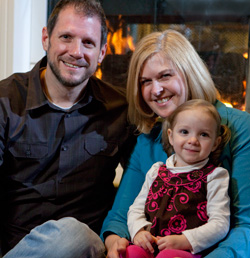Hodgkin Lymphoma Survivor
Lymphoma survivor learned to accept help

Jill Foster is a 44-year-old project manager who used her matter-of-fact mindset to help put her Hodgkin lymphoma firmly in the past. Throughout the course of her treatment, Jill avoided looking at any cancer-related statistics because she didn’t want them to negatively affect her attitude. Sure enough, she was able to maintain an unwavering belief that she could conquer this disease, even on days when she was too exhausted to get out of bed. Now 10 years cancer-free, Jill enjoys watching sports and hanging out with her husband, their two-year-old daughter and their mixed-breed rescue puppy.
The day I got a stem cell transplant and became cancer-free was a good day. I no longer visit my hematologist or undergo regular PET or CT scans. I simply visit my primary care physician once a year. But, I did have to fight to get here.
I made an appointment with my doctor because I felt like I had a sinus infection—not because I noticed any out-of-the-ordinary symptoms. During the exam, my doctor discovered that my thyroid was enlarged so she performed some tests. They all came back negative, but she wasn’t convinced so she ran even more tests. Her hunch proved accurate. In January 2001, the test results revealed a mass behind my thyroid and a biopsy confirmed that I had Stage IV Hodgkin lymphoma. I was just 31 years old.
A lot of cancer survivors describe a sense of shock and fear upon their diagnosis. For me, it mostly felt like an annoying inconvenience. I wanted to get it all over with as quickly as possible, so instead of seeking a second opinion, I just dove right into treatment. If I were to do it all over again – knowing what I know now – I would have taken the time for a second opinion. But I was a young professional and just wanted to put it behind me.
I started a chemotherapy regimen. I went in for treatment every two weeks unless my blood cell counts dropped too low, forcing me to skip a cycle. About halfway into the regimen, a PET scan showed that the cancer was gone, but my doctor decided to continue treatment to be sure. After my last cycle, another PET scan showed that my cancer was back. A series of tests followed, which eventually confirmed that result. I was officially rediagnosed with Hodgkin lymphoma.
This time around, I wasn’t in such a rush and I actually decided to switch doctors. My new doctor presented my case to a panel of experts at her hospital, and they all came up with a treatment plan as a team. She then sent that treatment plan to a bloodborne cancer specialist to confirm that it was the best course of action. Because so many opinions had gone into its development, I felt very comfortable with this new plan.
I had two doses of inpatient chemotherapy. I then started a high-dose chemotherapy and total body irradiation (TBI) in August. The treatment lasted for seven straight days, and then on the eighth day I had the stem cell transplant. I have been cancer-free ever since.
During my treatment, I bore the brunt of the physical effects, which included severe fatigue, nausea and mouth sores. But my family and friends really shouldered the emotional effects. I could tell that it was mentally difficult for them to watch me fight this disease. They often would ask me what they could do to help—partially, I think, because they weren’t quite sure what to do, what to say or how to act around me. My first instinct was to decline their offers. I didn’t want to burden them. But I eventually learned to let them help and even began asking for it. Accepting a ride to an appointment or asking for a grilled cheese sandwich not only helped me, but it helped them, too.
Lymphoma forced me to go through a lot, but I really don’t feel like it changed me. Through everything, I did my best to not dwell on all of the problems I was facing. Rather, I maintained an unwavering belief that I was definitely going to survive this, and here I am today—a survivor.


